|
It’s been incredibly fun and inspiring being in a band again. And not just any band, but a group of people who are tuning into the same channel as me and are open to exploring other channels as well. Music is a very personal thing. Because of that, the relationships within bands are important. I’ve been in bands where some people didn’t get along with certain others. It was just a personality thing. It happens. But I always felt as though the music suffered, at least for me. I play music mostly from my heart. Some musicians play mostly from their heads. We all play well. One might even argue that the musicians who play from their heads are more precise and therefore better players. I would argue that it depends on the listener. Like the musicians who create the music, there are some who listen more with their heads and others who listen more with their hearts. I’ve worked successfully with “head” musicians” because we got along personally and could work out any conflicts. When I’m in a band, that band becomes another kind of family. All families have issues and disagreements and, all families handle conflict differently. Not all birth families share the same politics, career choices, lifestyles, diets, etc. but they can still get together as a family and appreciate and love each other. It’s the same for bands. You come together for the music from different places. Then, you “make beautiful music together.” An urban dictionary defines “making beautiful music together” as “having a great romantic relationship with each other.” It’s true. I have fallen in love with band members. How could I not, when we share a heart-to-heart connection every time we play together? Music is one of the most moving and bonding things that humans experience. Scientifically, it has been shown that engaging in musical activities releases dopamine and affects our endorphins which leads us to feel good and connect with others. Wow! No wonder I can’t stop. And, I’ve been doing this my whole life. In the early 80s through early 90s, I was in a band in Albany. It was me, my husband Paul, and whoever else we could find. We named the band General Eclectic because when asked to describe our music one of us said, “Well … generally speaking … we’re pretty eclectic.” Hey, that would be a great name! We had a lot of fun and did some pretty crazy shows back then. It was in an era when bands would create cool flyers to hang up. We loved adding that to our creative resume. We played at least once a month, usually more, making unique flyers for each show. Sometimes our shows had themes. One was “On Beyond Zappa.” We did about 30 songs, one for each letter of the alphabet (by artist – Allman Brothers, Beatles, etc.) then a few originals. There was a prize for whoever could name every song and artist. We had one winner because we chose a lot of very obscure songs that crossed genres. It was such a popular show, we did a second one, “On Beyond Zevon.” That one was a bit more challenging since we couldn’t repeat an artist. We both really loved, and I still do love, a challenge. Below is the poster from one of my personal favorite shows. You will have to guess the theme from the clues on the poster because I’m not ready to put that in print yet. We had hoped to do three of these, but we only pulled off two of the planned three. They were very intense multi-media, and very multi-dimensional events. And, they were a lot of work and a lot of fun. So here I am in a new band. We don’t really know each other well. They certainly don’t know a lot of my history, except for the little bits I’ve shared so far. And, I don’t know theirs, but I would like to. We’ve all come a long way on very different roads to get here. So far, we all get along well, and everyone seems to be pretty easy-going. I know that I’m not always the easiest musician to work with because I’m picky and also a total space cadet. Generally, I tend to be absentminded, clumsy (because of not paying attention), and I lose things constantly. I might be the most flexible person I know, going whichever way the wind blows. My partner describes me as spontaneous and never really plans on my being home when I say I will. Luckily, he doesn’t seem to mind. My music is definitely flexible also. I guess you could also call it spontaneous. I hope my bandmates don’t mind too much. So far so good, and I’ll keep trying stay on track, not that I’ve had a ton of success so far. Meanwhile, that spontaneity is helping us develop that all-important bond that grows each time we get together. I always look forward to band practice. That’s how I know this is working.
0 Comments
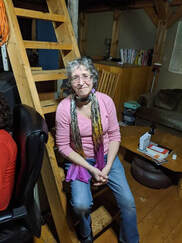 Ever since I moved to my current home in Petersburg, NY, I have said that I am living the life I never even dreamed was possible. I won’t go into the sordid details of why that is true, just know that after too many years of struggle, I am still amazed. My family responsibilities have lessened dramatically; although I’m certainly not rich, I am financially solvent; my life is mostly stress-free, other than the usual minor annoyances; I have a loving partner who is as easy going as I am, who shares the same ideals and beliefs, who is sharing a comfortable common lifestyle with me; and my home is peaceful and beautiful, surrounded by nature, the kind of home I’ve always looked for. All of these things have freed me up to pursue those dreams I never let myself have until now. As if all of those things aren’t enough, my home has a professional recording studio on the top floor and an incredible sound engineer to go along with it. I have been a musician my entire life and working professionally since I was 15. I also started raising a family when I was 22 and struggled economically throughout. I continued doing gigs and writing songs, played with my husband, Paul Cavanaugh, in a rock band and dreamed of being able to release a CD someday. Alas, we never pulled that off. However, I finally did release a CD of mostly original folk songs and tunes in 2009 with my next partner, Dick Kavanaugh. We were Cavanaugh & Kavanaugh. That was thrilling and satisfied that goal. I started focusing more on my songwriting after that, booking singer/songwriter gigs, going to more workshops, etc. Around that same time, I started writing a blog and a series of memoirs. For years, people told me that I should write a book about my adventurous life but the idea of writing a whole book felt too overwhelming, so I started writing short memoir pieces. Then, after a music class one day, a dad from one of my classes asked if he could trade recording time for his daughter’s classes. Of course, I said yes and decided to try to do a solo CD. During this process, I met Joel Patterson. He really is the “finest man.” We hit it off immediately and, after months of commuting back and forth between Petersburg and Albany, we realized how silly it was to keep two homes. So, he invited me to move in. I had been a member of a memoir group that met monthly and, one time, shared a song I’d written that went along with the memoir for that month. They knew that I was working on this CD and suddenly suggested an album concept of spoken word memoirs for each song. I mentioned it to Joel, who recorded all of the memoirs, the last three songs and mastered everything. Now, including an archival CD of General Eclectic, the rock band with Paul Cavanaugh, I have three CD releases of three very different styles of music.  So back to today … I have a new single. Dandelion Wine came into the studio last night to record “Finest Man.” I love this band! We work well together, and everyone brings something different to the mix. We’re all flexible and easy-going, and we’ve learned to go with the musical flow when necessary. I love that connection that all of the players get after working together for a while. The communication happens through the music almost without the need for words. These guys have been so accepting of the different genres of music I present and of learning more new songs than they might usually be working on, including my originals. And, I thank them. When you live a life of hardship, you stop dreaming big. You take on an acceptance of whatever comes your way without expectations. It’s necessary to do that in order to survive intact. That’s why it’s so big when the things you never dreamed about just drop in your lap. In the past year, I have formed a band, gone to China, released an EP of children’s songs, released three music videos and now will be releasing an original single. Wow! Life is good! I am eternally grateful! 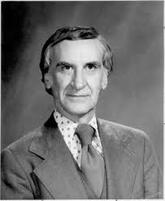 I thought I would start a series of musical memoirs, chronicling my life through music, but then politics reared its ugly head again. That has gotten me thinking about my father who was very proud to be a newspaperman. For me, this meant being gaining an incredible education in history and political science. Dad started out as a cub reporter and photographer at a newspaper in Little Falls, New York then quickly moved to Stamford, Connecticut where he worked his way up through the ranks, city editor then managing editor and finally editor-in-chief. Long before he became editor, he was a political reporter and columnist. My dad was a conservative republican, so the paper, in an effort to be fair and balanced, also had a democratic reporter and columnist. There was definitely a rivalry between these two men that I heard about daily. Dad was very good at his job and worked his way up the ladder fairly quickly. He also had some of his articles and columns picked up nationally on the AP and UPI wires. He even appeared on “Meet the Press” that was filmed in Manhattan. We weren’t sure he would survive that experience. Shy as he was, he almost passed out from the anxiety of appearing on television. Because I grew up in a household where we were surrounded by politics and current events, I was educated in a way that most of my peers were not. My parents were very social and either hosted parties or attended them often, and my brother and I usually tagged along. Most of the men at these social gatherings were lawyers, businessmen and political figures. Everyone believed that the kids should be included in the discussions, if we wanted to be. Like my dad, I was very shy, so I mostly listened, except at home. Then, I argued ferociously for what I thought was right. I rarely agreed with my dad and his cronies when it came to politics – the Viet Nam War, Civil Rights, the Women’s Movement, etc. But there was a tolerance for differing views back then, and I was encouraged to explore my own opinions and to back them up with facts. Today, a lot of my friends see the republicans as the enemy. I still see them as people who believe differently than myself. They are not evil as a group, though some of them may seem individually evil. Nor are the democrats or socialists or communists evil as a group. We are all humans, and like humans, we have our strengths and weaknesses. There is good and bad in all of us. Some of us are more ruled by emotions, some are motivated by money, and the list goes on. I’m sure my dad would not have supported Trump during the last election. Dad was an old school republican and would have been horrified by this president’s behaviors. He believed in a system of government, not in a loose cannon that does what he wants regardless of any advice from his most trusted counselors. Would he have supported this latest attack on Iran? Maybe. I’ll never know, and I wish he were here to ask. He was a brilliant man who, although I didn’t agree with his politics, was fair-minded, respectful and honest. He would have all his facts laid out for me to consider and encouraged me to do the same. It saddens me that I can’t discuss politics with friends who may have opposite views because of the emotional attachments that seem to be so pervasive. I like to know what the other side is thinking, what they believe in. I was raised to want that. When I read the news, I always try to read from more than one point of view. How can I really learn if everything is one-sided? How can we move forward, if we all have our heads in our own sand pile? We may not change each other’s minds, but we can still listen and try to understand. I think this is why we are so polarized. We’ve stopped listening and just keep feeding our anger. I’m sure that ultimately, it all comes out of fear. Unfortunately, the more we hid from diverse knowledge, the more fearful we will become. I remember a time when democrats and republicans worked together in a spirit of compromise and mutual respect. I hope it’s not too late to return to that model. Below is a eulogy written after my dad’s death by one of the many inexperienced reporters that Dad hired, having seen great potential in him as he had in so many others. I'm sorry he isn't here to talk to but I'm glad he didn't see what's become of the politics that he so loved. Editor's note: Roland Blais, who was a political reporter, columnist and eventually editor of The Advocate during the 1960s and '70s, died Nov. 11 in Troy, N.Y. Blais was managing editor in 1978 when Advocate Staff Reporter Anthony R. Dolan won a Pulitzer Prize for special local reporting. Dolan wrote the following as a eulogy for Blais. I knew Roland Blais as a friend but especially as a newspaperman, a title of which he was proud and deservedly so. Like so many others who are today at the top of their profession at the New York Times, Conde Nast Magazines and the Associated Press, I owed my own start in journalism to Roland. All of us will always be grateful for his willingness to take a risk on inexperienced writers who knew little about the newspaper business except that they wanted to be part of it and were willing to learn. And learn we did, as Roland took The Advocate from a small paper of unassuming appearance and limited influence to a modernized operation that not only had that dramatic new technology called the personal computer in its newsroom but actually ran investigative reporting articles in its news pages. As he managed The Advocate's transition, Roland built on his own experience as a reporter and editor and took the paper and its staff to new levels of achievement. Balancing the demands and needs of both the old and young -- by which I mean an 84-year-old publisher and an inexperienced staff -- Roland's tenure saw the transformation of the paper into an enterprise of credibility and impact. All of that credibility and impact would be needed as The Advocate in the mid-1970s began exposing in Stamford a classic matrix of organized crime and municipal corruption. The Advocate would uncover serious corruption in eight city departments, including a police department where a rackets commander was taking $1,800 a week from the Gambino crime family and a detective sergeant was running the largest drug ring in southern Connecticut out of police headquarters. Eventually, 15 city and state officials would resign or be fired; so too police officers, other officials and organized crime figures would be indicted and convicted. Stamford's leading political figure -- who was also state senate majority leader and talked about as the next governor -- would lose his reelection bid and a lawsuit he brought against The Advocate. At the center of all this controversy was Roland; his courage and competence were tested, and he met that challenge. Yet his influence extended well beyond helping to right wrongs in Stamford. In June of 1982 I found myself in the small personal office of Attorney General William French Smith facing a Department of Justice senior staff that had crowded into the room, among them unknown people such as Rudy Giuliani and Kenneth Starr and Theodore Olson. The attorney general asked me to tell them the story of Stamford and The Advocate and this I did, along with presenting a five-point program for a crackdown on organized crime. Out of that meeting came the anti-mob effort President Reagan announced in October 1982. In a few years, organized crime prosecutions quadrupled, and U.S. attorneys everywhere made the attack on the mob a priority. According to the head of the FBI's organized crime squads, a federal government that had been losing the struggle against the syndicates suddenly began holding its own and for the first time winning that struggle. The Los Angeles Times picked up on the role Stamford and The Advocate played and ran a story about The Advocate headlined: "Reporter's Dream Comes True." Yet it was hardly just my dream. At the time I spoke with Roland about what had come of his efforts and those of so many others. He expressed great delight. It was my privilege to visit with him and the staff in Troy and give there a brief talk on investigative reporting. I was given an engraved watch as a keepsake. I wear it proudly and often think of Roland Blais, my friend and newspaperman. So, Roland brought big change to The Advocate and his work made life better for many. Still, he was an unassuming man -- I can still see him sitting as he did in the luncheonette across from The Advocate building having the same meal he had every day. And, as I discovered when we went to New York for one awards ceremony, he was no fan of big cities. Yes, Roland Blais was Smalltown America -- and in the best sense of that term. It is traditional to write the number "30" on newspaper copy to signify the end of the story. But that can't done with Roland's story. He is remembered today as he always will be as a loving husband, father and grandfather. He will be remembered as a good friend and a newspaperman who exposed wrongdoing and stood up for the truth and helped make life safer and freer for countless numbers of people. Most of all, he will be remembered as a man of faith who followed in life the path he so firmly believed God lights for each of us to see us safely home. Today I join in your prayers of gratitude for Roland's life and in your prayers for his safe journey home and for the repose of his soul. Anthony R. Dolan was chief speechwriter at the Reagan White House for eight years and served in the President George W. Bush administration as special adviser in the offices of the secretary of state and the secretary of defense. |
Archives
January 2024
Categories
All
|

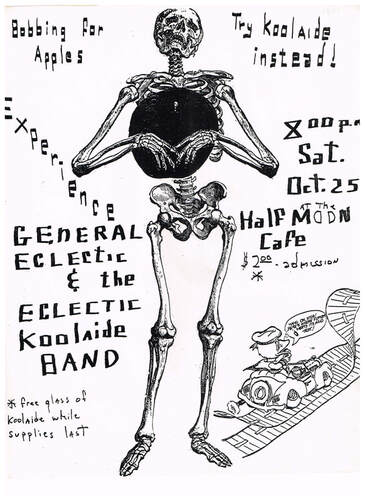
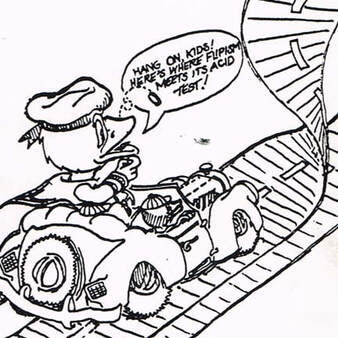
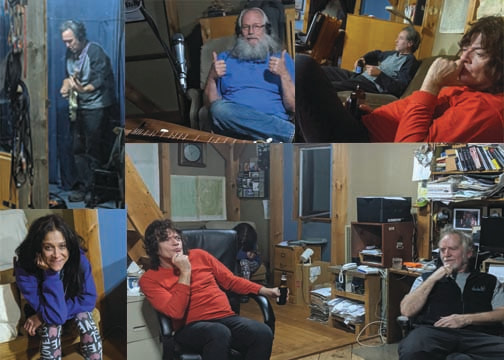
 RSS Feed
RSS Feed